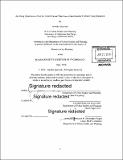Are gang injunctions a tool for gentrification? : the case of the Glendale Corridor Gang Injunction
Author(s)
Quevedo, Jennifer
DownloadFull printable version (4.898Mb)
Alternative title
Case of the Glendale Corridor Gang Injunction
Other Contributors
Massachusetts Institute of Technology. Department of Urban Studies and Planning.
Advisor
Justin Steil.
Terms of use
Metadata
Show full item recordAbstract
My research aims to understand the connections between police practices, court decisions, and gentrification, and focuses on the Glendale Corridor Gang Injunction. The injunction encompasses both the Silver Lake and Echo Park community, but mostly is in the Echo Park neighborhood. Echo Park is a community in LA that has undergone significant demographic changes in the past ten years. Local organizers and residents repeatedly questioned the function of the injunction in an area where crime has been decreasing and the neighborhood is increasingly attracting young white professionals. Indeed, residents critiquing the injunction are also addressing the tension arising from gentrification and the displacement of low-income communities of color across Los Angeles, like many other cities in the U.S. Through both qualitative interviews and statistical analyses I investigate the motivations for pursuing the Glendale Corridor Injunction, the connection between the injunction and demographic changes, and the effects the injunction has for people on the ground. The research leads to a conclusion that while gang injunctions are not motivated primarily by gentrification, the fear of displacement and over policing communities of color is not mutually exclusive. Both gentrification and gang injunctions have negative impacts on community member's sense of belonging in their own community.
Description
Thesis: M.C.P., Massachusetts Institute of Technology, Department of Urban Studies and Planning, 2016. Cataloged from PDF version of thesis. Includes bibliographical references (pages 64-67).
Date issued
2016Department
Massachusetts Institute of Technology. Department of Urban Studies and PlanningPublisher
Massachusetts Institute of Technology
Keywords
Urban Studies and Planning.